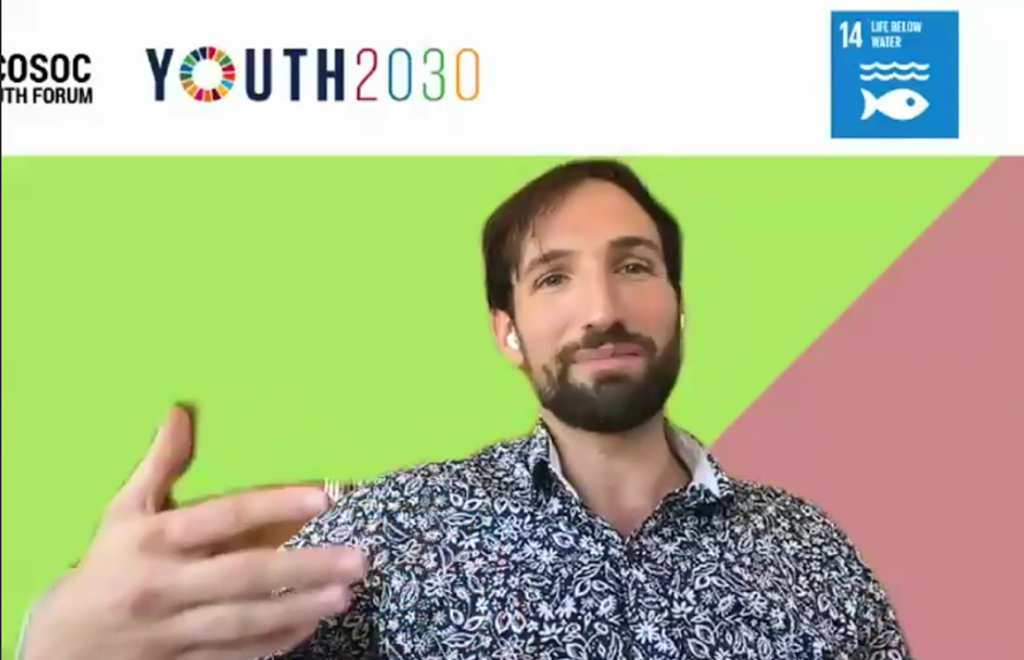The 2022 ECOSOC Youth Forum began its two day run on April 19th, with many plenary sessions and youth-centered discussions on world issues and the UN Sustainable Development Goals (SDGs). Our Peace Boat US interns attended the “Life Below Water and Youth: Connecting Generations to Protect our Ocean” breakout session, discussing how innovations in ocean technology and our societal attitudes can help achieve SDG 14 (Life Below Water).

The panel of speakers featured Gator Halpern from Coral Vita, Palmira Cuellar Ramirez, Brandon Levy from Sustainable Ocean Alliance, Lefteris Arapakis of Enaleia, and Stephanie Schandorf, the associate director of the Gulf of Guinea Maritime Institute–each with unique backgrounds and approaches to solving ocean issues. The conversation began with the question of ocean literacy: how should we improve awareness of ocean issues, especially within communities harboring no direct ties? Stephanie suggested integrating the matter further into our curriculums. Despite a growing focus on the climate, we still provide insufficient knowledge of the ocean during schooling, meaning few pursue careers in the sector or study ocean science at a degree level. Pamela added that the focus should not be strictly technical, but with scientific and cultural knowledge coalescing in an ideal world. She believes no member of civil society should be demeaned or considered lesser in their contribution to ocean knowledge, whatever its origin may be.
Gator and Lefteris shifted the discussion to the private sector, acknowledging the fishing industry and its role in plastic pollution. Traditional market dynamics have not encouraged sustainable ocean solutions, but both believe that for-profit companies still have the potential to be a force for ecological good. Brandon highlighted how working toward innovation in this area had benefited him personally. He believes that the rewarding work he does in the field has allowed him to achieve a degree of self-realization; he goes on to state that mental health is key and that positivity must color inter-organizational dynamics within these fields in order for meaningful work to occur.

The next topic concerned youth involvement in the fight for SDG 14. How can youth contribute and what can be done to help them? Gator believes that less red tape will help youth initiatives get off the ground easier. Young people should be free to experiment with different social enterprises in order to generate something truly novel and transformative. This sentiment was shared across the panel with Stephanie advocating a more humanistic and social approach to ocean advocacy. A more accessible model that does not require scientific qualification. Making the field too academic risks disinterest. Brandon Levy believes that we are already seeing this trend in action with an observable increase in youth attendance to ocean conferences and innovation forums. His organization, the Sustainable Ocean Alliance, is looking to further increase that number through their Ocean Leaders program. They provide funding, mentorship, and capacity-building resources for individuals or organizations working toward SDG 14. At present they have provided support in over 160 countries and will be leading the Youth and Innovation Forum for the upcoming United Nations Ocean Conference in Lisbon this June, together with UN Global Compact.
While the general outlook of the panelists was positive, with there being a sense of growing momentum about the movement toward greater ocean awareness, there is still a long way to go. Youth participation and ocean literacy may be on this rise but the world still faces a dire challenge that requires innovative solutions and legislative action. Projects investing in the youth are immensely valuable, but work toward SDG 14 must begin today as the responsibility of all. Change must be imminent and far-reaching if we are to effectively address the manifold problems we face.
